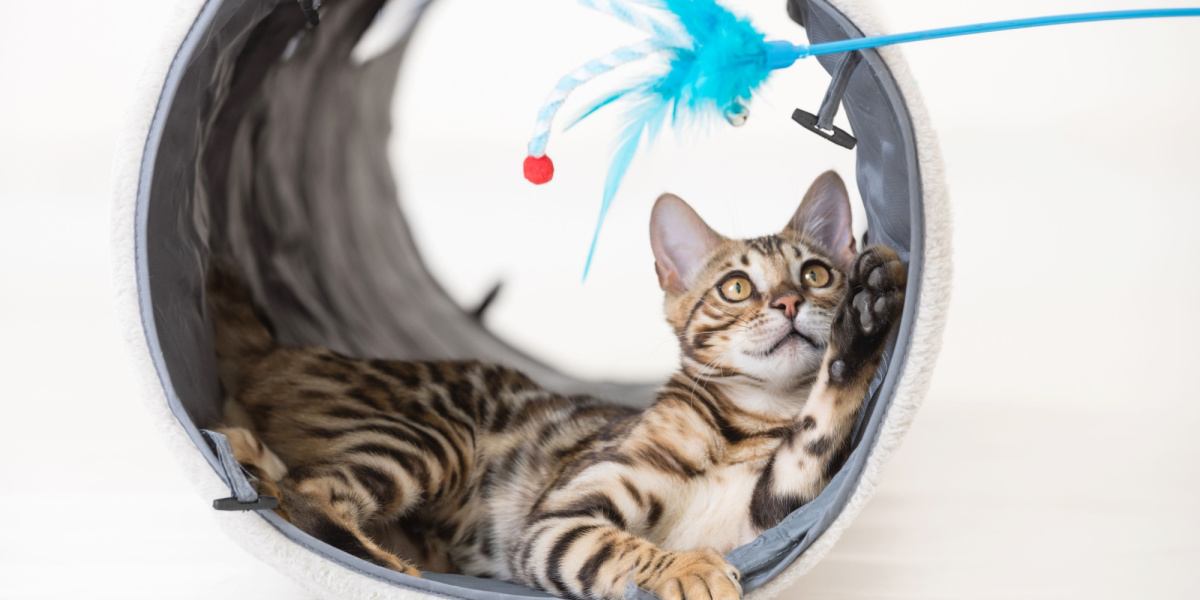
If you hear a cat hissing, it is usually meant as a warning, often seen as one of the low steps on the ladder of aggression for cats. It is an intimidating sound and can be of great concern to owners if their cat gives a hiss when playing.
Hissing is a negative vocalization for cats, associated with warning and with escalating aggression. Hissing during play commonly occurs due to overexcitement or rough play. Hissing can also occur due to confrontation, pain, or annoyance.Key Takeaways
It is key to remember that cat behavior and communication are very different from our own, and being able to interpret your cat’s body language, vocalization, and other signals is important for a harmonious relationship.
Hissing doesn’t mean that your cat is aggressive—it is merely a form of communication that something isn’t right. If your cat makes a hissing sound during playtime, it is most likely due to overstimulation during the game.
Other reasons for hissing include pain or annoyance, or it might be that your cats are actually fighting rather than playing! Read on for more information about how to tell why your cat is hissing during play, and tips on what to do.
Also Read: Why Does My Cat Hiss at My Partner?
What Is That Hissing Sound?
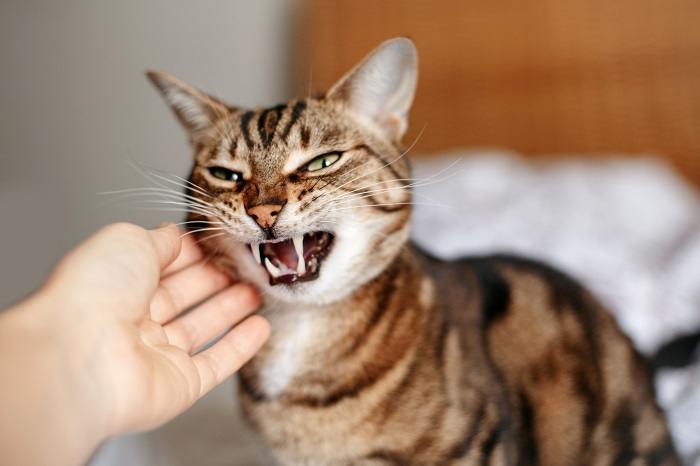
Cats hiss as a warning sign before moving on to more aggressive behavior such as biting or scratching.
A sudden expulsion of air out of the mouth creates a cat’s hissing sound. When hissing, the cat usually holds its mouth open wide, with teeth on display and tongue tucked away. Hissing might be accompanied by other negative body posturing, such as a hunched back, dilated pupils, flattened ears, and fluffed-up fur (piloerection).
Hissing is a natural and normal sound for a cat to make, although it is associated with negative mood states such as fear, anxiety, and aggression. It is often used as a warning—a precursor to more physically aggressive behavior, such as biting and scratching.
Also Read: Why Does My Cat Stick Their Tongue Out Sometimes?
How Do Cats Play?
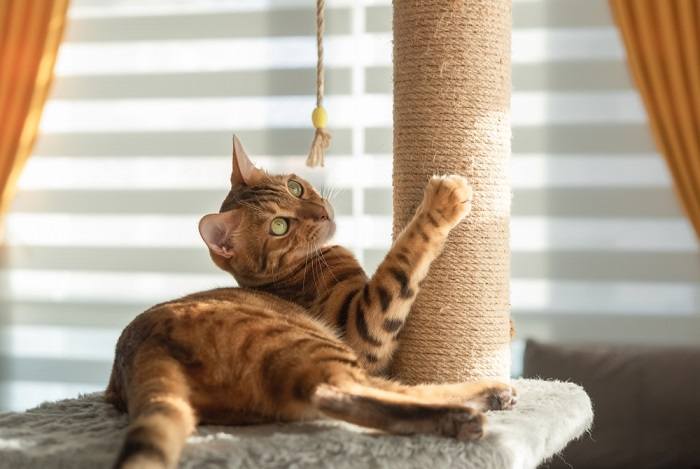
Play helps cats practice innate behaviors and serves as social and bonding time.
Play is hugely important for cats. It functions both as an innate need to practice and develop vital survival skills and also as a social interaction to learn boundaries and develop communication.
Play sessions usually occur between cats of the same social group, rather than strangers. Cats that live in the same household are not necessarily always in the same social group. You can tell if your cats are bonded as they will initiate positive physical contact with each other, such as grooming, touching noses or rubbing faces, and sleeping together.
Littermates are often closely bonded, but unrelated cats can form strong bonds, especially if they have been together since they were kittens or young cats. However, it is perfectly possible to have multiple cats living in the same house that are not bonded but merely tolerate each other.
Play between bonded cats is usually silent and involves lots of wrestling, pouncing, and chasing. Reciprocal, joyous, and fun play usually involves relaxed body language, upright ears, and multiple short breaks. Both cats take equal turns to be the one who leaps or pounces onto the other.
Also Read: How To Safely Play With A Cat, According To A Cat Behaviorist
Why Do Some Cats Hiss When They Play?
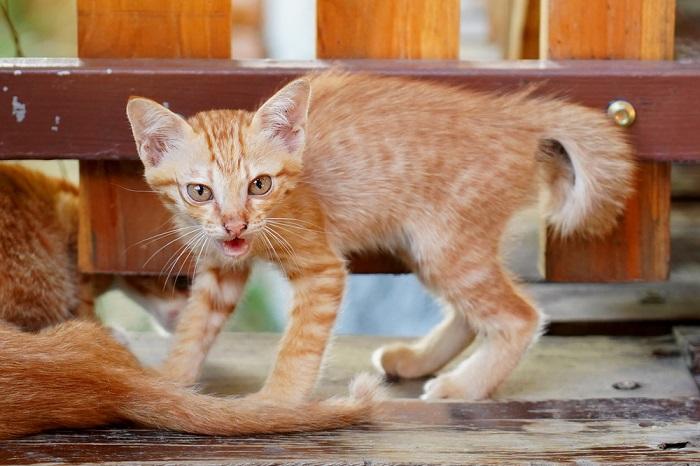
A cat might hiss as a warning if play becomes too rough or scary.
A hiss from a cat is a warning sound, a sign that all is not well. If your cat usually plays well with another cat, other pets, or a human family member, and gives the occasional hiss, this doesn’t mean that they are an aggressive cat, that they hate playing, or that anything is wrong. It probably just means that the play session became a little too much or some boundaries were crossed, and they’re letting the other participant know.
However, lots of hissing and growling during play sessions is not normal and should be of concern. Here are some things to consider if hissing is becoming a more prominent part of your cat’s vocalizations.
1. Aggressive Play
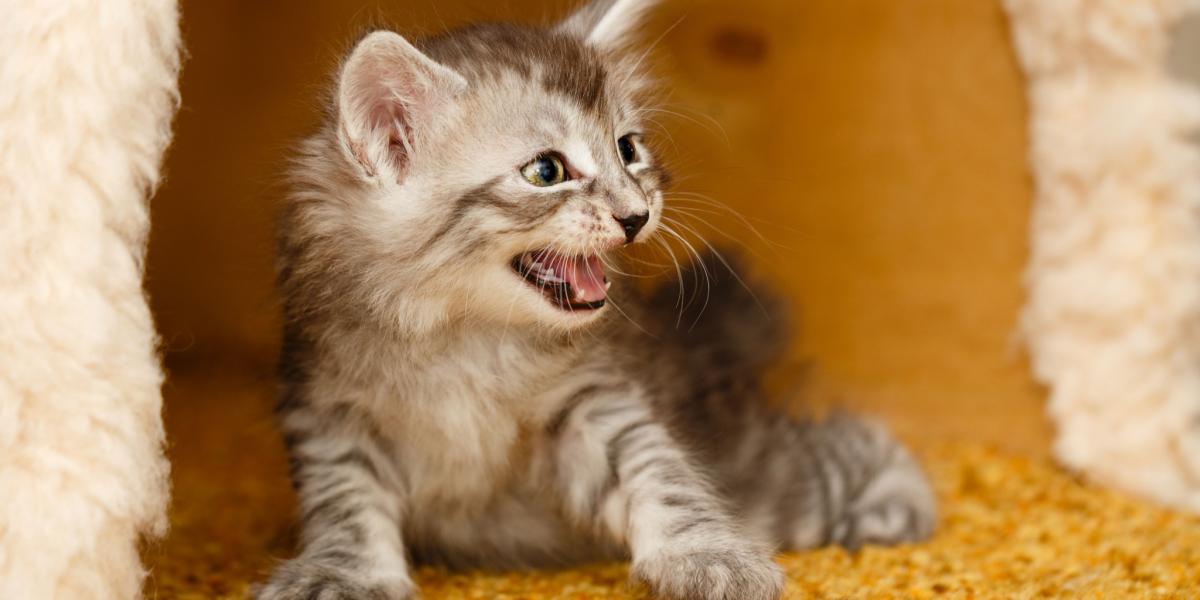
If one kitten plays more roughly than another, some hissing or even growling might occur.
A common reason for hissing during play is that one member of the party is not having a good time because the play session has become overexciting, overstimulating, and a bit too rough. Kittens, especially, can become overstimulated quickly and have not yet learned good social boundaries.
Some pets play more aggressively than others, and if there’s too much rough play, your cat may be trying to signal that they’ve had enough. The hissing might be paired with defensive body languages, such as flattened ears, pinned-back whiskers, a stiff or twitching tail, and fluffed-up fur.
If you think that your cats’ play session is turning into more of a confrontation, it might be a good idea to break up the session and let the cats cool off. Don’t intervene physically—you could get hurt. Instead, try and distract the cats with treats or toys.
Also Read: How To Teach Your Cat “No”
2. Annoyance
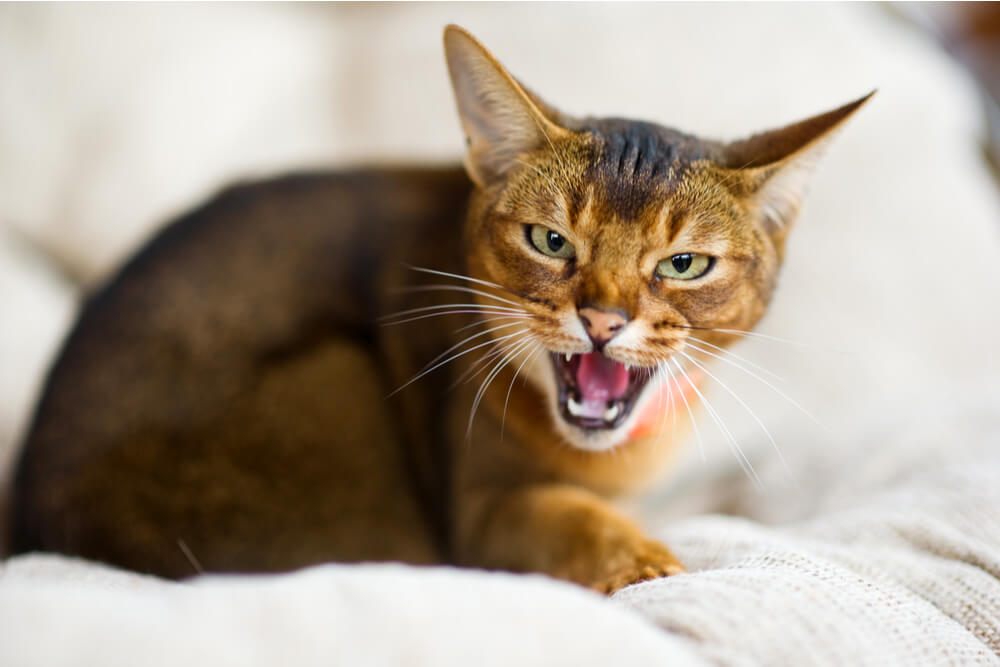
Hissing communicates that the cat is not in the mood to play, even if another pet is trying to initiate a game.
Cats can hiss when they just feel plain old fed up. Perhaps a new kitten is trying to play with your older cat, and they don’t want to, or perhaps your dog is pestering a mother cat who’s trying to look after kittens.
Hissing can be a sign that one pet wants to play, and another doesn’t. A hiss is a clear signal from a cat, and will usually lead to the other cat backing off. If they don’t, they might get a swat!
If you have a pet in your household that doesn’t participate much in play, provide plenty of hiding places for them, and other resources for them to engage with instead, such as cat trees or toys.
Also Read: Best Cat Window Seat & Perches
3. Confrontation
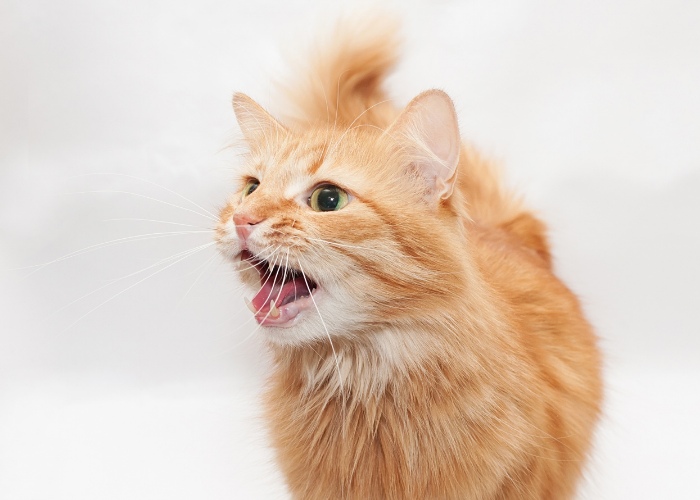
Play-fighting can sometimes morph into real fighting, especially if cats are feeling stressed.
Cat play often involves a lot of play-fighting, such as chasing and pouncing, so it can be difficult to differentiate play from actual confrontation. Body language is key. Defensive or aggressive signs in cats include tense postures, flattened ears, pinned-back whiskers, and fluffed-up fur. Growling and hissing are a sure sign of a real fight.
Aggression in multi-cat households is often due to lack of resources and territory control. Make sure all cats have their safe areas, with their own resources, such as litter boxes, food, water bowls, toys, and beds.
If one cat is actively aggravating the other, consider separating them by means of a barrier or even a baby gate. A pheromone diffuser can help keep the household calm and provide anxious cats some comfort.
Also Read: How Do Cats Mark Their Territory?
4. Pain
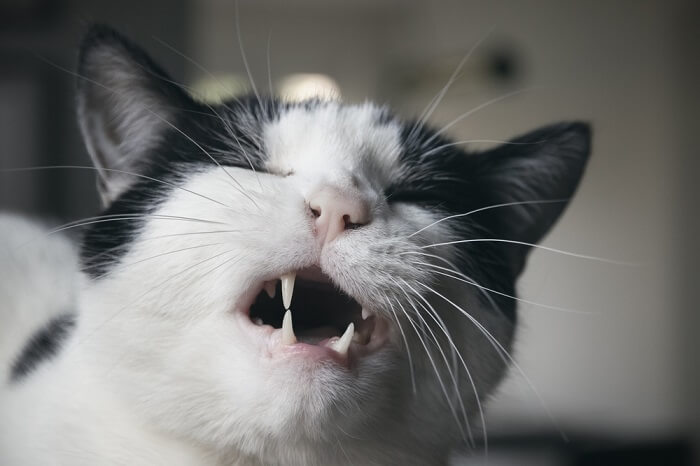
Sudden hissing with no identifiable trigger might be a sign your cat is experiencing pain.
If your cat has started hissing during play, physical contact, or grooming, they might be in discomfort. Any behavior change in cats can be significant, and a change in play behavior or interactions with other cats can be a sign of a medical problem.
If your cat has changed their response to you, or other pets, it is recommended to seek advice from a veterinarian. A checkup with a vet can rule out pain and other health problems.
Also Read: What Can You Give A Cat For Pain? 6 Vet-Recommended Options
Cats Hissing in Play: In Summary
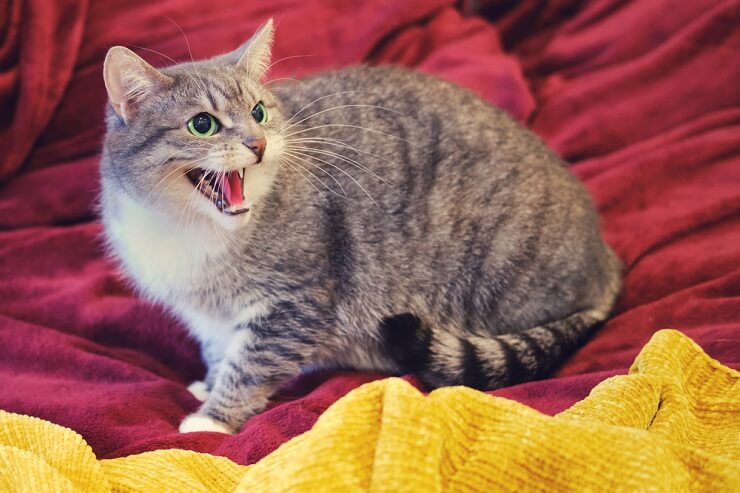
Occasional hissing during play is normal, but investigate frequent hissing to find out what’s bothering your cat.
A hissing cat is giving a clear warning that all is not right. The odd hiss during a rough-and-tumble play session is nothing unusual—it’s just your cat communicating with the other pet. If, however, the hissing is frequent or escalating, then some intervention might be needed. It is important to differentiate the rough play from actual fighting, pain, or annoyance, and provide a safe alternative for all pets.
Also Read: How To Get A Cat’s Attention In 7 Simple Steps
Frequently Asked Questions
Why does my cat hiss when playing with me?
A hiss from a cat is a warning sound, a signal that something isn’t right. Hissing during play usually means that the playtime has become too rough or too stimulating, and a break is needed. Pain, fighting, and annoyance can also lead to hissing in cats.
Do cats hiss when they are happy?
No, a hiss is a negative vocalization for a cat, usually given as a warning sign. Hissing and growling can be precursors to physical aggression if the warning is not heeded.

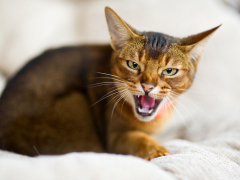
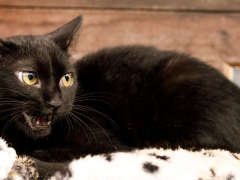
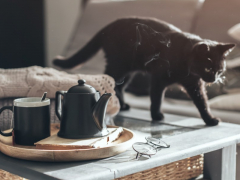
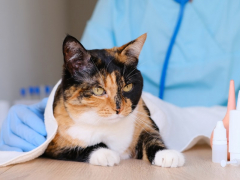
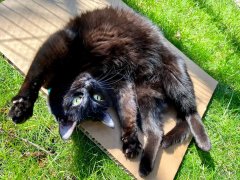
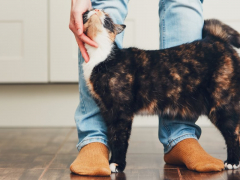
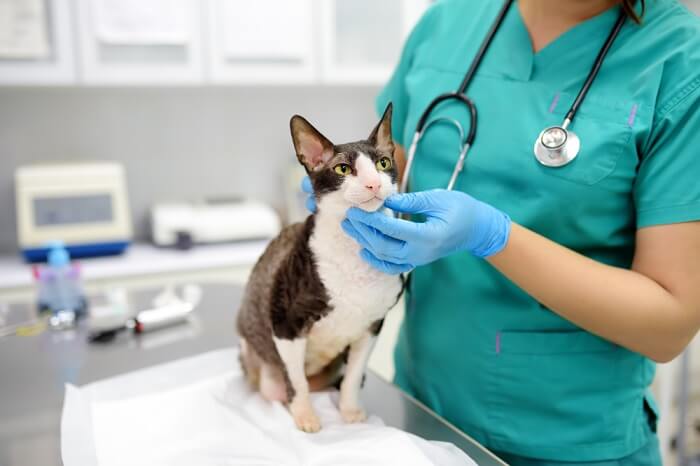
I have a 12 yr old Calico. She’s not very social and never has been.I’ve had since 4-6 wks old. When I groom her, all of a sudden she either bites me or scratch’s me. And I’m left bleeding. She’s NEVER been hit or mis-treated. Don’t like to be cuddled or held. either. She will come to me now and then to get her back scratched. She gets up on the bed at nite with me for just a little whille and let’s me rub her back, sometime’s even her belly. Then all hell break’s loose. She’ll bite or scratch me. Then leaves. She does talk to me a little. She’s never been sick. She eats Chicken Pate and Purina Cat Chow. Both have Veggie’s .Won’t eat any other flavor. I myself think it’s the Ferral Cat in her. She was born a Ferral. Would appreciate any opinion You could e-mail with. She has ben Neutered also. I’m at wits end.